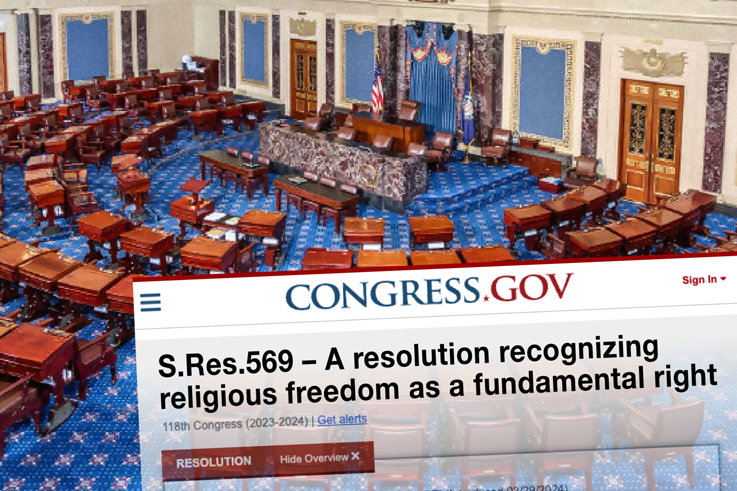
-
HOME
-
WHAT IS STANDOur Mission Our Values Our Help Contact
-
WHAT WE FIGHT FORReligious Freedom Religious Literacy Equality & Human Rights Inclusion & Respect Free Speech Responsible Journalism Corporate Accountability
-
RESOURCESExpert Studies Landmark Decisions White Papers FAQs David Miscavige Religious Freedom Resource Center Freedom of Religion & Human Rights Topic Index Priest-Penitent Privilege Islamophobia
-
HATE MONITORBiased Media Propagandists Hatemongers False Experts Hate Monitor Blog
-
NEWSROOMNews Media Watch Videos Blog
-
TAKE ACTIONCombat Hate & Discrimination Champion Freedom of Religion Demand Accountability
Religious Leaders and Scholars Urge Passage of Senate Religious Freedom Resolution
Over 100 religious freedom advocates have signed a letter urging the U.S. Senate to quickly pass a resolution recognizing religious freedom as a fundamental right. The letter, a testament to the broad multifaith support for international religious freedom as a cornerstone of U.S. foreign policy, expresses deep concerns over the escalating threats to religious freedom around the world.

The letter in support of Senate Resolution 569, was written by the International Religious Freedom Roundtable (IRF Roundtable). It is collectively addressed to the Senate majority and minority leaders and the chairman and ranking member of the Senate Foreign Relations Committee. The signatories, representing a diverse range of religious freedom advocates, affirm the “utmost priority” of religious freedom in U.S. foreign policy as laid out in the resolution. They stand united in their support for the recommendations outlined in it and conclude, “We view these recommendations as absolutely essential for the protection and promotion of religious freedom worldwide. For all of these reasons, we strongly support S. Res. 569 and urge the Senate to quickly pass it.”
“The fundamental right of every person to have a faith, live your faith, change your faith, or have no faith at all must be recognized throughout the world.”
The bipartisan Senate Resolution 569 the letter supports was presented on February 29. In a little over 10 pages, it stipulates that freedom of religion is a fundamental right embedded in the nature of democracy, lays out the national roots of religious freedom from America’s infancy, and cites nations where abuses of religious freedom exist. The resolution recommends that the Department of State “promote religious freedom as an utmost priority for the United States in implementation of United States foreign policy.”
The resolution, furthermore, urges accountability through economic and other sanctions to hold violators liable and to support and defend activists, journalists and civil society leaders who speak out for religious freedom in countries where it is abused.
Senator Tim Kaine, who co-sponsored the resolution with Senators Chris Coons, James Lankford and Thom Tillis, said, “The Virginia General Assembly passed a statute in 1786 that became the basis of religious freedom in America. Because of our example, many people who live in countries around the world where religious freedom is non-existent see the U.S. as a beacon of hope—a place where people of all faiths can live in the same neighborhoods, attend the same schools, and work side by side. Amid the sharp rise in attacks on faith-based communities, I’m joining my colleagues to send a clear message that we must work together to protect religious freedom at home and abroad.”
Co-sponsor James Lankford said, “The fundamental right of every person to have a faith, live your faith, change your faith, or have no faith at all must be recognized throughout the world. Countries like China, Russia, and Iran continue to target and persecute citizens for living this most basic freedom. The United States must continue its international leadership to defend religious freedom, which is why we are reaffirming our commitment to fight for religious freedom around the world.”
“The United States must maintain our steadfast commitment to standing up for religious liberty,” said co-sponsor Thom Tillis. “This resolution expresses our unwavering support for victims of religious persecution and reaffirms our support for safeguarding religious freedom worldwide.”
The signatories of the IRF Roundtable letter represent a widely diverse range of faiths and cultures. A sampling includes the American Sikh Council, the Buddhist Solidarity Association, the China Aid Association, the Church of Scientology National Affairs Office, the Union of Councils for Jews in the Former Soviet Union, United For Human Rights, the Episcopal Church, the Russian Orthodox Autonomous Church of America, Inc., and individuals representing, among others, the Ethiopian Tewahedo Orthodox Church, Global Christian Relief, the Rumi Forum, Genocide Watch and the Asian Children’s Educational Fellowship.
The IRF Roundtable is an informal group of individuals from all faiths and none, including governments, who regularly discuss IRF issues off the record. The group advises, enlightens and advocates for religious freedom to lawmakers, civil society leaders, and stakeholders around the world.
STAND applauds this bipartisan effort to strengthen religious freedom—a fundamental human right that is built into the Creed of the Church of Scientology and is precious to Scientologists the world over.






